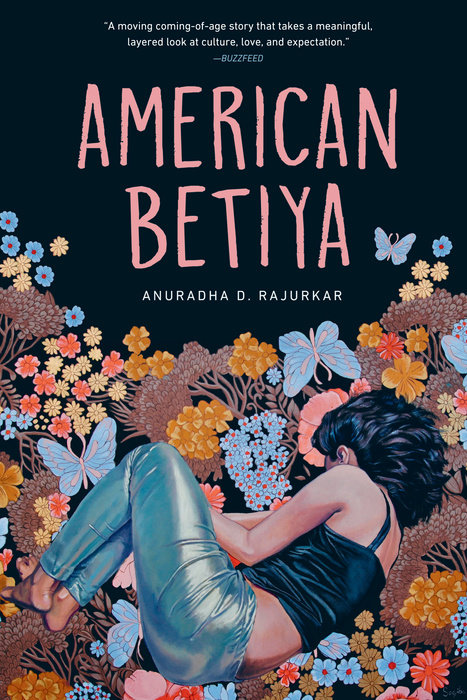American Betiya
Author Anuradha D. Rajurkar
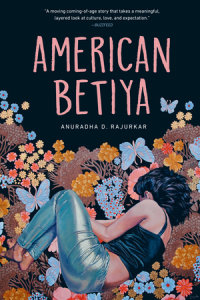
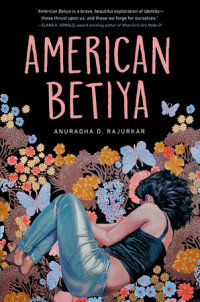
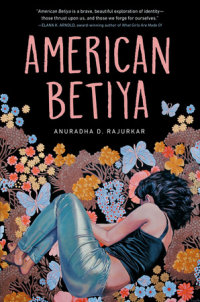
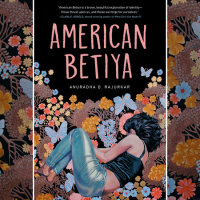
American Betiya
A luminous story of a young artist grappling with first love, family boundaries and the complications of a cross-cultural relationship. Perfect for fans of Sandhya Menon, Erika Sanchez and Jandy Nelson.
Praise for American Betiya
A Bank Street College of Education Best Book of 2022
A YALSA Best Best Fiction for Young Adults
A Cosmopolitan Best 100 Books of All Time
A Book Riot best YA Book of 2021
A South Asia Book Award 2022 honoree
A Children's Cooperative 2022 Best Book…
A luminous story of a young artist grappling with first love, family boundaries and the complications of a cross-cultural relationship. Perfect for fans of Sandhya Menon, Erika Sanchez and Jandy Nelson.
Praise for American Betiya
A Bank Street College of Education Best Book of 2022
A YALSA Best Best Fiction for Young Adults
A Cosmopolitan Best 100 Books of All Time
A Book Riot best YA Book of 2021
A South Asia Book Award 2022 honoree
A Children's Cooperative 2022 Best Book of the Year
A 2022 Nerdy Book Club Best Novel Award Winner
Rani Kelkar has never lied to her parents, until she meets Oliver. The same qualities that draw her in--his tattoos, his charisma, his passion for art--make him her mother's worst nightmare.
They begin dating in secret, but when Oliver's troubled home life unravels, he starts to ask more of Rani than she knows how to give, desperately trying to fit into her world, no matter how high the cost. When a twist of fate leads Rani from Evanston, Illinois to Pune, India for a summer, she has a reckoning with herself--and what's really brewing beneath the surface of her first love.
Winner of SCBWI's Emerging Voices award, Anuradha D. Rajurkar takes an honest look at the ways cultures can clash in an interracial relationship. Braiding together themes of sexuality, artistic expression, and appropriation, she gives voice to a girl claiming ownership of her identity, one shattered stereotype at a time.
"A brave, beautiful exploration of identity--those thrust upon us, and those we forge for ourselves." --Elana K. Arnold, award-winning author of What Girls Are Made Of
"Captures the heartbreaking impetuousness of that all-consuming first love, the tightrope we walk as we seek to navigate cultural tensions . . .” —Gae Polisner, author of The Memory of Things
"A bold coming-of-age piece.” –Buzzfeed
An Excerpt fromAmerican Betiya
Chapter One
He’s my mother’s worst nightmare. His intricate tattoos and the way he’s been covertly studying me from across the gallery would give her palpitations for sure. Dude does need some manners, I think as he stashes away several damaged portfolio sleeves before glancing over again. Avoiding his gaze, I turn to arrange my glossy artist’s statement cards. Seriously. Who is this guy? I take a long swig from my water bottle and attempt to refocus.
It’s my first-ever Gallery Night opening, and I’m still in shock that I was invited. My photographs—the ones I took with my grandfather in India last summer—pop against the burgundy walls. Artwork is hung floor to ceiling, and modern sculptures on pedestals are strategically placed and uplit like deities. I submitted my photos to this student art show on a whim, and amazingly, they were chosen. Framed, polished, and practically art, they’re gleaming images of India that I can’t stop looking at, despite having seen them a thousand times before.
Across the room, the guy’s eyes flicker to me again, and…
Chapter One
He’s my mother’s worst nightmare. His intricate tattoos and the way he’s been covertly studying me from across the gallery would give her palpitations for sure. Dude does need some manners, I think as he stashes away several damaged portfolio sleeves before glancing over again. Avoiding his gaze, I turn to arrange my glossy artist’s statement cards. Seriously. Who is this guy? I take a long swig from my water bottle and attempt to refocus.
It’s my first-ever Gallery Night opening, and I’m still in shock that I was invited. My photographs—the ones I took with my grandfather in India last summer—pop against the burgundy walls. Artwork is hung floor to ceiling, and modern sculptures on pedestals are strategically placed and uplit like deities. I submitted my photos to this student art show on a whim, and amazingly, they were chosen. Framed, polished, and practically art, they’re gleaming images of India that I can’t stop looking at, despite having seen them a thousand times before.
Across the room, the guy’s eyes flicker to me again, and I flush when he catches me looking. I pretend to study a nearby sculpture. If only I could lurk behind my camera lens, I’d avoid all this nonsense. I need to recenter: I am calm. I am confident. I am legit. A fresh stream of gallerygoers comes pouring through the double doors, and I brace myself, flashing my brightest smile: Some of them I know a little too well.
Close family friends I call my auntie-uncles spill in like a wedding baraat minus the horse. A sight in the prim atmosphere—a crowd blinged out in jewel-toned saris and yellow gold—they’re Indian Standard Time late but quickly make themselves at home. Calling my name, they come barreling into my corner, the aunties shrieking as they kiss and hug me, the uncles raising their glasses in a toast, having already somehow descended upon the nearby refreshments. Eyes flicker to us, some shining in wonder, drinking in the scene, and others bemused, like we’re a comedy.
I love these people, but God.
“Proud you’re showcasing our India with these photos, Rani,” Veena Auntie says, chucking me under the chin while making a smooching sound. “Goodness knows we need more representation in the arts.” Veena Auntie is my artsy auntie—she’s a potter when she’s off dental duty—and probably the only one who gets the magnitude of my being here. I squeeze her hand.
A dozen auntie-uncles now cluster around me, chatting and ignoring the artwork. And then—as if there’s not enough of a scene—my parents bustle in. Baba shuffles across the gallery floor, hands in his pockets, while peering at the pomp and circumstance of an event devoted to something as self-indulgent as art. Beside him marches Ma in a blazing coral sari—one of the favorites she wears for Indian parties. She scans the gallery critically, a Mumbai mama bear ready to take out anyone who messes with her family.
God.
They arrive at my exhibit, and my mother’s hands butterfly about, finally settling on my hair. As she twists a wild lock behind my ear, I glance in the guy’s direction. Despite a significant crowd by his exhibit across the gallery, he’s doing what he does best—staring, like we’re rare birds.
“Did you get enough to eat earlier, betiya?” my mother says.
Baba makes a quick sweep of my photographs, jingling change in his pocket. “Nice photos, Rani.” He jabs a finger at the one of my grandfather grinning from the rust-colored steps of a crumbling temple. “Ay, I thought I took this one.” He winks at me.
The next hour’s a full-on visual and noise extravaganza— an Indian party in my tiny nook. Pratap Uncle tells an admittedly funny joke at top volume, and Baba throws his head back and belly-laughs. Indu Auntie is wearing too much rose oil, the floral scent gripping us in the fist of its power. A couple of aunties knot and arrange my scarf while launching into a barrage of questions: Would I be willing to convince their kid to apply for an internship at the hospital, or consider Hindi lessons, or take AP bio next year? Mira Auntie whips out a bright pink lipstick and begins dotting it on my lower lip, saying to the others, “Ay-yo! She’s now our very own Amrita Sher-Gil!” When I ask who that is, she looks at me in surprise. “The famous Indian painter? Like the Indian Frida Kahlo, no?” She scans my face, and I shrug deeply, a bratty American. She turns to the others and announces, “We are failing our youth, yah! Even Rani here knows nothing of our India—shame on us.”
My mother asks me a couple of times about my homework situation, all the while keeping every human within her vicinity under close surveillance. Her gaze settles on the guy across the room, and her face fills with concern as she takes in the stark branches etched along his arms.
God.
If only my grandfather, my aajoba, could appear. He’d find a way to distract my mother, saving me as always.
But my best friend, Kate, appears instead. She waves cheerily to the auntie-uncles before touching my mother’s arm. “Mrs. Kelkar, hi!” She hugs my mom tight, then appraises her, holding her by the shoulders. “You look gorgeous,” she says, fingering the cluster of tiny seed pearls that clings to my mother’s earlobe. “You know I’m giving Rani a ride home, right?”
My mother’s eyes light up. No adult on earth can resist Kate’s charms. “Thank you, betiya,” she says, beaming. (Case in point: non-Indians are never addressed as “betiya,” a term of endearment reserved for those you consider daughters—my mother would gladly adopt Kate if possible.) “Auntie-uncles are coming for dinner at our place tonight. You come, too, yah,” my mother demands in her special way.
“You guys head back and party,” Kate says, grinning. “When this is over, we’re so there. I literally cannot wait to taste your parathas.”
They are magic words. As Kate flits off to talk to Mimi and her grandmother the next exhibit over, my parents and the auntie-uncles finally line up and file out, hugging me again and telling me congratulations and how much they enjoyed my “sweet little pastime.” I thank them, smiling and waving at the receding chaos before slumping onto my stool in silent relief.
“Quite an entourage.” It’s him, leaning against my wall like freaking James Dean. He tugs on his silver-studded earlobe and gazes at me with that weird-but-weirdly-flattering intensity. I’ve totally seen him before.
“That’s a generous way of putting it,” I say, and immediately feel guilty. Why am I slamming my family and friends to this random stalker guy?
He grins, raising a silver-hooped brow, and holds out his hand. “Oliver Jensen.”
“Rani,” I say, grasping it. It’s dawning on me who he is. His hand is big and warm. Not that I notice.
“Rani,” he says, trying it out. “Dang. Great name.” Slipping a hand into the frayed pocket of his jeans, he returns to his James Dean lean against the wall. A faint blush rises in his face, undercutting his veneer of cool.
“I think I’ve seen you in the Arts Wing. You—you’re a senior, too, right?” I say, as though I don’t already know the answer.
Oliver nods. “Yeah. And if I could live in the Arts Wing, I would.” He rubs his head, his hair sticking up in dark tufts. He looks at me straight on and smiles, and despite myself, I see something in that smile, something deep and wide and real. You will not fall for this clown.
I twist my mess of silver rings.
“I love your work,” Oliver says, studying my photos. He steps closer to the one of my aunt swinging from the hanging roots of a banyan tree. “Where was this taken?”
“Near my grandparents’ place. Pune, India.”
“Amazing that you’ve been to India,” he murmurs, scrutinizing my other shots. “Immersion in a culture like that . . .”
Pushing my hair from my face, I tug at the scarf the aunties knotted tight at my throat.
“Man. This one,” he says, peering at the photo of my grandmother standing before a string of shanty shops. “The light’s refracted in a way that highlights the irony here.”
I nod like he’s onto something, but really I have no flipping idea what he’s just said.
“Those women sweeping garbage behind your—is it your grandma? Their colorful saris create this, like, brilliant juxtaposition . . .” He trails off, studying the shot.
“Yeah, I was really angling for all that when I took it.”
He scans my face, and whatever he sees there breaks him into an embarrassed grin. “Sorry, that came out super pretentious.” Heat flushes his face again. “Anyway. You must know these kick ass.”
“Right,” I laugh, heading toward his crowded gallery wall. “Why do I have a feeling that there’s no comparison here?”
Oliver trails me to his exhibit, and we stand before a collection of his paintings, suddenly enfolded in the lush fantasy of a Hobbit world, beasts and beings live and thriving upon linen canvases. There are at least fifteen frameless pieces, hung as if by happenstance. They look lit from within, like the loose, uncut rubies I once raked through at a Mumbai jeweler’s—precious and raw.
“Yeah. These are not terrible.”
Rocking on his heels, he stares down a group of nymphs in a flowering forest. I think about my meager snapshots and flush. But he mutters, “Whatever. Demons, gargoyles . . . mundane shit.”
“Wait, what? But these colors, your technique—”
“Rani. Anyone can learn that.” He leans in like he’s sharing a secret. “But what you’ve got there?” He smells like fresh herbs and soap. “It’s so relevant and, like, of the moment.”
A couple of beats and then . . . I can’t help myself. I grab the pencil from behind my ear—when getting ready at home, I decided it made me look “artsy”—and air-scrawl in my palm. “My . . . family . . . ‘relevant . . . and . . . of . . . the . . . moment.’ Got it.”
His eyes trail over my hair, down to the hollow of my throat, where the sterling amulet from my cousin Shalini rests. They flicker to my hands—my bitten, bare nails. I fidget, twisting my rings as I glance toward the exit.
Is he mad that I mocked his compliment? Possibly that was too much. The truth is, I have no experience with guys, for the following reasons:
1. I’ve been too busy studying, working like a dog toward my goal of one day becoming a pediatrician like my aunt Lalita Mami.
2. My strict-ass parents—whom I love and adore but who obviously drive me crazy—don’t allow me to date. They’re even uncomfortable with the notion of guy friends. Seriously.
